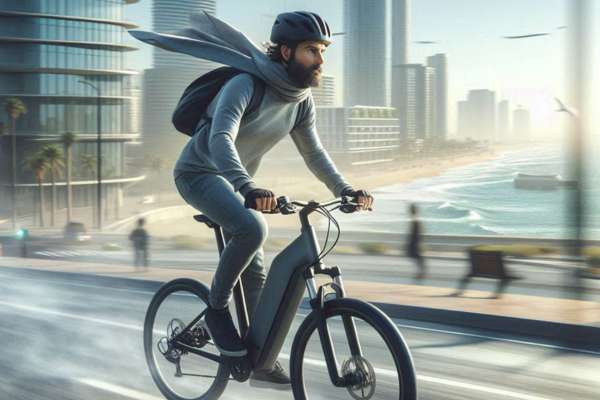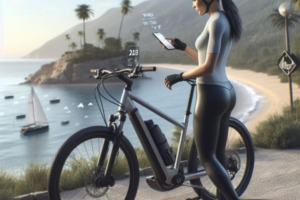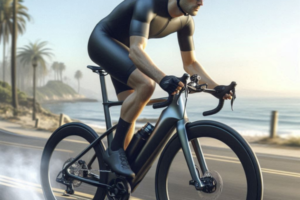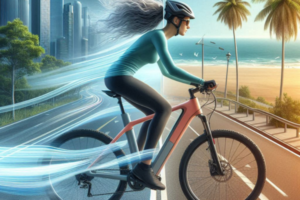Aerodynamics safety wind stability electric bicycles — these interconnected elements shape every ride, especially in humid coastal cities where the wind isn’t just a breeze, but a force you ride against or with. 🌬️🚴♀️ Whether you’re navigating a seaside promenade or weaving through urban wind tunnels between buildings, wind becomes a powerful influencer of control, energy use, and overall confidence on an e-bike.
Many riders think of wind purely as resistance — something that slows you down. But in truth, it’s far more dynamic. Wind, especially in cross or gusting forms, can shift your trajectory, destabilize your balance, or force you into dangerous overcorrections. If your e-bike setup and posture aren’t optimized for this invisible challenge, even short commutes can become exhausting or risky. 🌀💨
Electric bicycles, with their added speed and motor support, amplify both the benefits and the risks. Moving at 25–28 km/h through unpredictable winds increases not only aerodynamic drag but also the potential for loss of control. And in coastal cities, where moisture clings to every gust and adds weight to the air, this problem compounds. The wind carries more than air — it carries risk. 🌊⚠️
💨 Why Aerodynamics Matter for Safety — Not Just Speed
While it’s common to associate aerodynamics with performance, the truth is that aerodynamics safety wind stability electric bicycles are fundamentally linked. A poorly streamlined setup catches wind like a sail. A forward-leaning posture cuts through resistance. Every design and posture choice either helps or hinders your ability to stay stable when the wind pushes back. 🛠️🧘♂️
Wind affects:
- 🟠 Your ability to steer straight in crosswind conditions
- 🟠 How much fatigue your core and shoulders experience over time
- 🟠 The wear and tear on components due to vibration and force absorption
- 🟠 Your confidence and response time in tight traffic or sudden obstacles
Without an aerodynamic mindset, safety is compromised before you even start pedaling. Every gust you encounter becomes a test — not of strength, but of preparation. That’s why thinking about wind from the perspective of both design and riding behavior is critical. 🧠⚙️
🌬️ E-Bikes and Wind: Why They’re More Sensitive Than You Think
Electric bicycles offer comfort, cargo space, and upright visibility. But these advantages come with a tradeoff: more surface area facing the wind. Compared to sleek road bikes, e-bikes often include wide frames, panniers, upright seating, baskets, and child seats — all of which become wind traps. In crosswinds or gusty conditions, these features can feel like sails pulling you in unexpected directions. 🧳📦
Wind instability is especially pronounced when humidity is high, as coastal air tends to be denser and heavier. This saturation increases drag and creates microturbulence around exposed parts of your bike — such as protruding cables or rack mounts. Over time, this not only drains your battery faster but also makes each ride feel like a constant battle for balance. 🔋🧱
💬 Rider Insight: “I always wondered why my commute felt harder after storms. It wasn’t just the wet roads — it was the sticky wind. Once I changed my posture and switched to narrower panniers, my bike stopped feeling like a kite.” — Elias, coastal commuter in Barranquilla
The interplay between aerodynamics safety wind stability electric bicycles should be part of every rider’s understanding — not just enthusiasts or racers. Because when the wind hits hard on a narrow bridge or an open boulevard, what matters most is how well your bike and body are prepared to handle it. 🚴♂️🌉
When considering aerodynamics safety wind stability electric bicycles, the environment you ride in matters just as much as your equipment. Wind behaves differently depending on the setting — and both urban and coastal landscapes bring their own unique aerodynamic risks. Understanding how your surroundings amplify or suppress wind effects can help you prepare better, ride smarter, and stay safer. 🌇🌊
🏙️ Urban vs. Coastal Wind Patterns: A Comparative View
In dense cities, wind funnels through narrow alleys and between tall buildings, creating sharp bursts of pressure in unpredictable zones. Meanwhile, in coastal areas, the wind is often more sustained and forceful — but also more predictable. Riders living in places like Miami, Cartagena, or Marseille know that even a calm-looking beach ride can become a windy workout. 🌬️
| Environment | Wind Behavior | Common Risks | Stability Impact |
|---|---|---|---|
| Urban Streets | Sudden gusts, wind tunnels, blocked sections | Crosswind surprises at corners or between buildings | High in specific zones; requires fast reactions |
| Coastal Roads | Sustained headwinds or sidewinds, salty air | Fatigue, drift during crosswinds, moisture drag | Persistent; requires posture and gear adjustment |
Both environments demand a different form of awareness. In cities, your reaction time is tested. In coastal zones, your endurance is. And if your e-bike setup isn’t adapted to either, wind will always win. 🏁
💡 How to Read the Wind Before It Affects You
- 🔍 Check flags, tree movement, or leaves swirling — these can warn you about invisible gusts up ahead.
- 🗺️ Use wind forecast apps before your ride — especially near bridges or open water zones.
- 🚦 Slow down before entering known “wind tunnels” between tall buildings or along coastlines.
- 🛑 Avoid wide open bridge crossings during peak wind hours (typically late afternoon).
Being able to anticipate how the wind will behave in your environment is one of the most underrated safety skills. It allows you to adjust posture, prepare your steering, and mentally ready yourself for sudden forces. That preparation is what separates a shaky ride from a stable, confident one. 🚴♀️🧠
💬 Community Tip: “In my city, the buildings do weird things to the wind. I mapped out which corners were the windiest and changed my route slightly. I feel 10x more stable now.” — Andrés, rider in coastal Montevideo
Aerodynamics safety wind stability electric bicycles becomes a lifestyle habit in these environments. Riders who tune into the wind — and plan for it — always stay one step ahead. 🌬️📍
Mastering aerodynamics safety wind stability electric bicycles means understanding how posture, gear, and smart setup reduce your vulnerability to crosswinds and gusts. It’s not always about buying new equipment — it’s often about adjusting what you already have. From how you sit to how your bags are mounted, each detail makes a difference. 🧩🔧
In coastal and windy environments, small misalignments or gear oversights can feel massive when the wind hits at full force. Below is a detailed checklist to help riders optimize posture, accessories, and control. These tweaks can drastically reduce instability and fatigue during every ride. 💨🚴♂️
🧾 Checklist: How to Increase Wind Stability on Your E-Bike
- ✅ Posture: Lean slightly forward to reduce frontal exposure. Keep your elbows relaxed and slightly bent to absorb gusts.
- ✅ Helmet: Use a low-profile, aerodynamic helmet with no visors or protruding edges that can catch wind.
- ✅ Clothing: Wear fitted, wind-resistant layers. Avoid flapping jackets, scarves, or anything loose that may act like a sail.
- ✅ Panniers: Mount bags close to the frame and use aerodynamic models with tapered edges. Avoid front baskets in windy cities.
- ✅ Cables & Accessories: Secure all loose straps, wires, or rain covers. Exposed elements increase turbulence and instability.
- ✅ Grip: Keep hands light but steady on the handlebars. Over-gripping can reduce your ability to respond smoothly to pushback.
- ✅ Knees: Tuck knees close to the frame to reduce side resistance and improve body-bike alignment.
Implementing just three of these changes often results in a noticeably smoother ride — especially during commutes near the ocean or in open rural zones with sustained winds. 🛣️🌬️
⚙️ Accessory Adjustments That Make a Real Difference
It’s easy to add bags, lights, locks, and water bottles without thinking of aerodynamics. But if you’re riding in humid coastal zones or cities with frequent gusts, these items can affect both drag and control. Consider the following upgrades:
- 👜 Replace bulky saddlebags with side-mounted aerodynamic panniers.
- 🔒 Store locks inside frame bags instead of externally strapped for less drag.
- 🔧 Swap front baskets for rear-mounted storage to improve steering control.
- 💡 Choose integrated lighting systems that don’t protrude from the handlebar area.
Some e-bike brands now offer “wind-tested” accessory kits designed to maintain control under airflow pressure — a sign of how seriously the community is taking aerodynamics safety wind stability electric bicycles. 🔍🔩
💬 Real-World Story: “I was getting pushed into traffic lanes on windy afternoons. After switching to slimmer rear panniers and tucking my cables in, my ride feels 50% more stable. I wish I had known sooner.” — Karla, delivery cyclist in Valparaíso
When you treat your e-bike as an aerodynamic system — not just a vehicle — everything improves: your speed, your safety, and your energy efficiency. And in coastal cities, that mindset is what turns breezy commutes into confident rides. 💪🌊
Maintaining aerodynamics safety wind stability electric bicycles isn’t just about gear — it’s about habit. Wind-related instability often stems from overlooked issues: misaligned racks, muddy wheel rims, worn tires, or loose fenders. When airflow is disrupted by small imperfections, the rider feels every gust more intensely. 🛞🌬️
Routine maintenance is your secret weapon for safe, stable riding. Just as you clean your drivetrain to preserve speed, you should also clean and align your gear to preserve aerodynamic integrity — especially if you ride in humid, coastal zones where salty air sticks to every surface. 🌊🔧
🔧 Wind-Focused Maintenance Tips
- ✅ Clean your frame and rims weekly: Dirt and grime increase surface turbulence. Use a soft sponge, water, and a non-corrosive bike wash to maintain smoothness.
- ✅ Inspect fenders and mounts: Loose or rattling accessories wobble in the wind. Tighten all screws and replace any warped components.
- ✅ Keep wheel spokes true: Warped wheels throw off balance, especially in crosswinds. Check spoke tension monthly or after rough roads.
- ✅ Secure wires and lights: Tape down or route cables through the frame where possible to minimize flutter and drag.
- ✅ Lubricate the drivetrain: A smooth transmission lets you respond faster to sudden gusts without mechanical lag.
These tweaks may sound simple, but they compound. In humid cities like Barranquilla, San Juan, or Recife, every bit of rust or buildup increases the chances of unexpected instability. ⚠️🧼
🧱 Keep It Smooth: Frame & Tire Attention
When your e-bike frame is coated in salt mist or your tires are unevenly worn, you’re not just slower — you’re more vulnerable. That layer of grime changes how air flows over your bike, increasing wobble and drag. Focus especially on:
- 🟣 Front tire tread: Ensure it’s even and grippy — it’s your first contact point with both wind and road.
- 🟣 Downtube cleanliness: This is where most headwind hits. A coated or dirty tube adds invisible resistance.
- 🟣 Saddle and handlebar alignment: Misalignment shifts your center of gravity, which makes crosswinds more disruptive.
Some riders even use hydrophobic ceramic coatings on frames to keep them slick and reduce both water and wind resistance. In high-humidity coastal cities, that kind of surface care isn’t luxury — it’s protection. ✨🔋
🌟 Thought to Ride With: “The wind doesn’t wait for perfect conditions — so make your ride ready for imperfect ones. A clean, tuned, and balanced bike turns gusts into a rhythm, not resistance.”
Once you shift your thinking from “fixing problems” to “preventing turbulence,” your entire ride evolves. Aerodynamics safety wind stability electric bicycles is not about perfection — it’s about removing little disruptions before they become dangerous. And the smoother your ride, the more enjoyable every breeze becomes. 🌬️🚴♀️
Aerodynamics safety wind stability electric bicycles is more than a technical checklist — it’s a mindset of care and anticipation. Riding in coastal cities or open wind corridors means learning how to dance with the wind instead of fighting it. Every cable you secure, every pannier you streamline, and every adjustment to your posture brings you closer to control, not chaos. 🌬️💪
❓ Frequently Asked Questions (FAQs)
Does wind affect electric bicycles more than traditional bikes?
Yes. E-bikes are often heavier, have bulkier frames, and include accessories like racks or baskets that increase frontal area — all of which make them more sensitive to wind pressure, especially in crosswinds.
How can I stay stable when hit by sudden gusts?
Lean slightly forward, relax your grip, bend your elbows, and lower your center of gravity. Avoid abrupt overcorrections, and slow down if needed to maintain better balance.
Do aerodynamic accessories actually improve stability?
Yes. Accessories designed with airflow in mind (such as contoured panniers or frame-integrated lights) reduce turbulence and side drag, especially at higher speeds or in coastal wind zones.
Should I avoid riding on windy days?
Not necessarily. If you’re properly equipped and aware of your surroundings, riding in wind can be safe. However, avoid exposed bridges or routes known for crosswind bursts, especially during peak gust hours.
What’s the easiest adjustment I can make today?
Secure or remove loose accessories, lower your handlebars slightly for a forward-leaning position, and switch to tighter-fitting clothing that won’t flap in the wind.
📣 Join the Wind-Savvy Rider Community
You’re not alone out there. Across coastal cities, open farmlands, and dense urban grids, thousands of riders are facing the same invisible challenge: the wind. And we’re all learning — together. 🚴♂️🌍
Share your story. Have you ever been caught in a gust and adapted your gear because of it? Did you change your panniers, fix your fenders, or discover a riding posture that made all the difference?
👇 Tell us in the comments. Your advice may help someone avoid a dangerous swerve, find better gear, or ride with more confidence tomorrow.
📬 Community Question: What’s one upgrade or technique that made your electric bicycle more stable in windy conditions? Drop your tip below — it might save someone’s commute.
Thank you for being part of this community, where every turn of the pedal is supported by experience, knowledge, and shared momentum. 💙 Keep riding forward — wind at your back, confidence at your core. 🌬️🚴♀️



